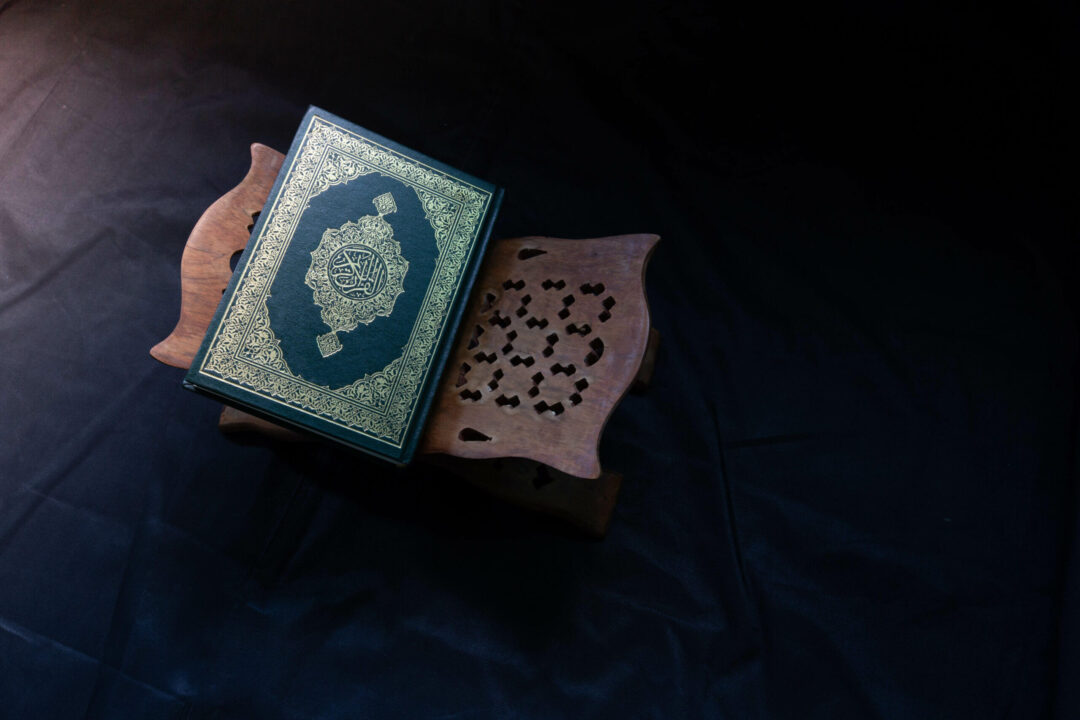Who is sovereign? This is not a purely speculative or theoretical question. It has concrete implications on questions of governance and state. It is, in an age of the fetishization of the state, a subversive question. In this article, I begin with an excursion into our present state of affairs, in relation to the fetishized modern state. I go on to explain the dimensions of what we call the political space in order to identify the origins of fetishization and tughyān (transgression) and introduce the concept of exteriority (that which originates beyond a hegemonic order, or state). I then identify two dimensions of tawḥīd, God’s creative will (irāda khalqiyya) and a more neglected dimension, God’s legislative will (irāda shar’iyya). I explore the ways in which these two dimensions of tawḥīd culminate in a liberatory philosophy and a radically new conception of politics. Finally, I explore the dimensions of God’s legislative will by examining the ways in which, contrary to the self-referential nature of the modern state, the Islamic polity is other-referential in that it is contingent onto (1) the absolute sovereignty of God and (2) the creative and dynamic authority of the community through the ijtihad and shura.
Politics, Fetishization, and Alienation
How are we to engage with a modern state that appears divine and absolute? How are we to imagine alternative conceptions of state and governance? Is the fetishization of the state a fait accompli? As Enrique Dussel explains, the fetish “is something made by the human hand but made to appear divine, absolute, worthy of worship, fascinating, tremendous, that before which one trembles in fear, terror, or admiration. Every system tends to fetishize, totalize, absolutize itself.”1 How does the fetishized state achieve such divinity? It is through the negation of exteriority. Exteriority refers to that which originates beyond the hegemonic order and as such represents a threat to that order. To overcome such a threat, the hegemonic order appropriates any such sources of exteriority into its orbit by recreating them in its own image. The most foundational of such appropriations is the fabrication of images of God, negating God’s temporal priority, and the creation of a God that legitimates the hegemonic order’s legitimacy. What is distinctive about the modern state, however, is its philosophical and legal legitimation of such fetishization through the invention of state sovereignty.2 The sovereign state is “conceived as the efficient agency of its own construction . . . comparable to the divine Creation ex nihilo. It holds that its “social contract” is a seemingly divine “original covenant” which becomes “a sacred, unquestionable tale whereby a people is brought – or rather brings itself – into existence.”3
To understand the origins of fetishization, it is imperative that we say something about (1) the nature of the political space as a space traversed by the will of political actors, and (2) the act of fetishization as an act of fabricating images of God. The political field, as Dussel points out, is “traversed by forces, by singular subjects in possession of will and a certain degree of power, and these wills are in turn structured within specific universes.”4 The hegemonic claim to ultimacy is not always that of Lordship but is, through and through, political ultimacy. This is what Dussel calls “the originary corruption of the political” because it is self-referential, closed, and results in fetishization.5 The corruption of the political begins when the state, and the will of its political actors, act as self-referential agents rather than delegated agents. That is, self-referentiality to the occlusion of the community, that is the source of political power, and the occlusion of God, as the divine authorizer of action, istikhlāf. The self-referential act of power corrupts both the political actors and the political community. It stands in direct opposition to obediential power and amounts to a fetishization of the political actor: “They cease to be representatives who act through delegation and instead become despots who demand that the people pay homage to their authority.” This results in the absolutization of the will of the political actor. The will of the political actor becomes a “will-to-power” as an existential orientation and end.
Through its will-to-power, the tāghūt creates new fictive covenants that re-create the individual and collective self, as through ex nihilo, for as we saw earlier, the self-enclosure of the hegemonic totality (its divination) necessitates a negation of exteriority and the recreation of man, God, and the cosmos in its own image. This, in turn, amounts to modes-of-alienation. First, it is because the political space is the creative space wherein the collective will can actualize and concretize its existential project. Second, it is an alienation for the collective capacity to engage in politics, which is a capacity that inheres in the very ontology of the self as a political being.6 As such, it is an alienation from the self as a self, and an alienation of the self from its existential project, which for the Muslim self, is tashhīd, īstkhlāf and the creative acts of ijtihād and shurā towards the enactment of justice, ‘adl. Ali Shariati refers to this as istihmār, to stupefy, the essence of which is the act of diversion, that is, the diversion of the individual and collective from its political, and concomitantly, its existential ends and project.7 Third, it circumvents the break from the second-creation to the first-creation, the return to the primordial self. Fourth, it is the alienation of man from the original covenant with God, through which, the self maintains an alterity vis-à-vis all temporal formations.
These modes of alienation find their contemporary expression in secularity, which replaces the sovereignty of God with the sovereignty of the world, the dunyā. This new form of transcendence, in turn, reduces the ‘political’ space to an autonomous manipulable space of ‘pure power’, one operating with a logic of domination. Politics is stripped of any relation to the Transcendent. As an autonomous space of pure power, it is closed onto itself, divinized and presents itself as a transhistorical absolute rather than a dynamic and open history receptive to the creative act of politics. This, in turn, amounts to a negation of spiritual self-affirmation because there can be no drive towards the Sublime who is now domesticated through the negation of absolute exteriority. The tāghūt descends into what the Qur’ān describes as a state of istighnā’, to think as though the self is free and independent of anything that is beyond itself. The Qur’an warns, “Surely man will transgress, if he sees himself to be self-sufficient” (Q 96: 6-7). The horizon of possibility – that is, existential prospects and their projects – are reduced to the immanent political and metaphysical horizons forged by secularity with no possibility of upward movement.
Two Dimensions of Tawḥīd
The doctrine of tawḥīd is the liberatory recognition of the divine creative will of God (irāda khalqiyya), which is to affirm that God, as uniquely transcendent, is beyond any temporal and historical formation, having created the world ex nihilo. This, as Dussel rightly points out, is to adopt an attitude of atheism towards any temporal order, the world, and the cosmos at large, for no existent, but God, can claim divinity in its origins. This affirmation alone, however, does not amount to a liberatory politics. History attests to the ways in which the image of God has been domesticated and recreated in the image of regimes. The essence of such fabrications is the negation of God’s temporal priority over such orders, the world, and the cosmos. Tawḥīd, the unicity of God’s attributes, is to recognize that both God’s irāda khalqīyya as well as God’s divine legislative will (irāda sharī’yyah). The recognition of God as being uniquely transcendent does not translate into the absence of earthly gods; the latter too need to be negated: “It is He who is the only God in the heavens (fi samā) and the only God on the earth (f’il ard)” (Q 43: 84). The Qur’ān states that the oppressed are the mustad’afūn fil ‘ard wherein fil ‘ard means on the earth, emphasizing the awareness of the temporal origins of oppression. There is another dimension of God’s temporal priority; the attributes of mulk and rububiyyah, which means God’s kingship and lordship in relation to the temporal world.
In negating the negation of absolute exteriority, we can now speak of a neglected dimension of tawḥīd, namely, the recognition not only of God’s creative and divine will (irāda khalqiyya) but God’s divine legislative will (irāda shar’īyya) and the authority of the community in discerning and establishing that divine will through the sharī’ah. That is to say, tawḥīd affirms both the ontological and temporal priority of God. To return to the verses mentioned earlier: It is He Who is the only God in the heavens (fi samā) and the only God on the earth (f’il ard).” Another verse states, “His is the creation and the command; blessed is Allāh, Lord of the worlds” (Q 7:54). The negation of fetishization, in other words, demands of the Muslim a recognition and testimony to both God’s creative will and God’s legislative will that is revealed in the Qur’ān. The need for this dual recognition stems from the fact that the creative will and legislative will emanate from the same telos in the same way they both emanate from the same origin: God (Q 45:22). The purpose of God’s legislative will, is, similarly, to enact and uphold justice: “Indeed, We sent Our messengers with clear proofs, and with them, We sent down the Scripture and the balance ˹of justice˺ so that people may administer justice” (Q 57:25).
The revelation of a divine legislative will requiring human embodiment brings us to a critical point with regards to justice in relation to the preservation of the balance: Man is not left to his own devices in determining what order is given in nature. To be left thus would result in the perennial risk of imputing a political form onto a distorted perception of nature and future fetishization. The just order that is constructed is not an arbitrary order that mirrors a distorted perception of the permanent nor is it an order that is imputed onto nature. It is an order that is given in nature (the creative will) and made manifest through the Qur’ān (the legislative will). As such, the Sharī’ah mirrors the creative will of God. Syed Muhammad Naqib al-Attas observes that Islam: “…emulates the pattern or form according to which God governs His Kingdom; it is an imitation of the cosmic order manifested in this worldly life as well as political order.” The Sharī’ah, more than just being legislative, reorients the relationship between man, the cosmos, and God wherein man and the cosmos are oriented towards a shared telos: justice. Tawḥīd is the means towards such a reorientation because tawḥīd is more than just a metaphysical theory of creation. It is an order in and of itself. As such, institutionalized power (potesta) is obediential (that is, other-referential rather than self-referential) and contingent rather than absolute. This is true in two important senses that require further elaboration.
Sovereignty of God and the Authority of the Community
The first sense in which power is contingent is in its being bound to the will of the infinite Other, God as the sovereign, expressed in the Sharī’ah. Thus, while the Qur’anic notion of jāhiliyyah decenters hegemonic regimes of knowledge, its corollary, hākimiyyah decenters fetishized and self-enclosed political centers of power. The Prophet (saw) states, “No obedience is due in sinful matters: behold, obedience is due only in righteousness [fil ma’rūf]” and “No obedience is due to him who does not obey God.” The establishment of the Sharī’ah is not an imposition onto reality but a fulfilment of reality given that sovereignty is an attribute of the most Real. Ibn Taymiyah states, “Ruling by what God has revealed unto Muhammad, upon him be peace, is but justice in a particular form—indeed it is the most perfect and best type of justice and ruling by it is an obligation of the Prophet himself as well as upon those who follow him.”8 Thus, the Qur’ān states, in both epistemic and political terms, that without recourse to revelation “surely man will transgress if he sees himself to be self-sufficient.” The tāghūt is not exclusively the dominating will that claims Godship but whoever exercises self-referential power, transgressing the Sharī’ah and the authority of the community.
The second sense in which power is contingent is in its being bound by the authority of community in a dual sense through ijtihād and shūrā. The discernment of the sharī’ah falls within the communal practice of ijtihād whereas the political authority of the community is embodied in the act of shūrā. That is to say, the authority of the community is both epistemic and political. Ijtihād in the communal discernment and establishment of the sharī’ah, as such, represents a dynamic and creative communal movement that eschews the presence of an ecclesiastical order or theocratic governance. The community is the source of authority because as the Prophetic narration states, the community is protected from error. This protection does not stem from an infallibility but rather a “dynamic process of mutual advice and correction, revival and reform, and commanding the good and forbidding the evil.”9 The communal act of ijtihad is not limited to discerning the ordinances of the Sharī’ah but includes the discernment of what the community deems to be just and unjust. Ibn al-Qayyim (d. 1350) states: “Just politics (al-siyasa al-‘adila) is not limited to the details of the Shar’ and is amenable to change based on changing times and places. Except that its general objective is the establishment of justice, and its standard and criterion are the attainment of the welfare of the community.”10 Ibn al-Qayyim also states that “By whatever means justice is established, that is part of the religion.”11
Through ijtihād, the discernment of the Sharī’ah becomes a communal act and through shūrā, political authority is vested with the community—amruhum shūrā baynahum, “Their communal affair (amr) is to be [transacted] in consultation among themselves” (Q 42: 38). The Prophet (saw) is reported to have said, “Follow the largest group”12 and “It is your duty to stand by the united community and the majority [al-āmmah].”13 The twin imperatives of ijtihad and shūrā demand a radically different concept of governance. Moreover, the Qur’ān describes the proper place of those in authority as “from you”, minkum. As Syed Mustafa Ali points out, this points to the contingent and conditional nature of the relationship between the ruler and the ruled, a relationship that is horizontal rather than vertical wherein the ruler has “the same ontological and political status as the ruled and cannot ‘Lord’ over the people.” Justice, in relation to the horizontal relations between mankind, refers to the negation of any claim to temporal sovereignty and their concomitant hierarchies. The terms used to signify justice in the Qur’ān (‘adl and al-qisṭ) signify the state of equalizing and levelling, as opposed to zulm which as we have seen, is a transgression of limits.
Notes
- Enrique Dussel, Philosophy of Liberation (Maryknoll, NY: Orbis Books, 1990), 96.
- On the question of sovereignty, see author’s essay entitled ‘The Invention of Sovereignty’, Genealogies of Modernity, 29 Mar 2022, https://genealogiesofmodernity.org/journal/2022/3/28/inventing-the-sovereign-state
- Eugene McCarraher, The Enchantments of Mammon: How Capitalism became the Religion of Modernity (Cambridge, MA: The Belknap Press of Harvard University Press, 2019), 10.
- Enrique Dussel, Twenty Theses on Politics (Durham, UK: Duke University Press, 2008), 5.
- Dussel, Twenty Theses on Politics, 3
- Ali Shariati, Binā al-Dhāt al-Thawrī (Beirut, Lebanon: Dār al-Amīr lil-Thaqafah wal-Nashr, 2007), 75.
- Ali Shariati, An-Nabaha wal-Istihmar. (Beirut, Lebanon: Dār al-Amīr lil-Thaqafah wal-Nashr, 2007), 55
- Ovamir Anjum, Politics, Law, and Community in Islamic Thought: The Taymiyyan Moment (New York: Cambridge University Press, 2012), 241.
- Anjum, Politics, Law, and Community in Islamic Thought, 242
- Anjum, Politics, Law, and Community in Islamic Thought, 243
- Anjum, Politics, Law, and Community in Islamic Thought, 242.
- Ibn Mājah, on the authority of ‘Abd Allah ibn ‘Umar.
- Ahmad bin Hanbal, on the authority of Mu’adh ibn Jabal.




